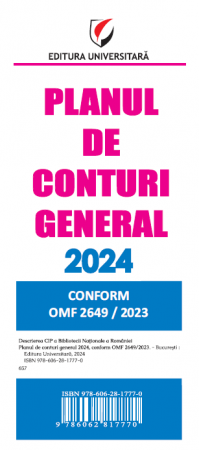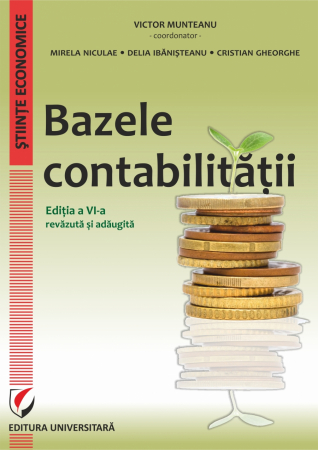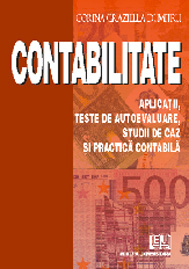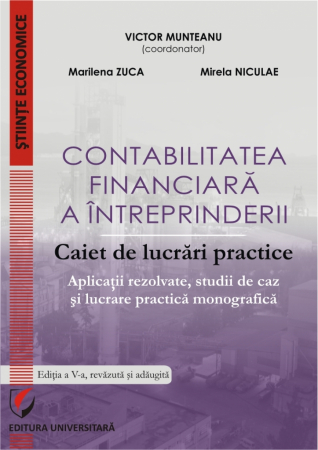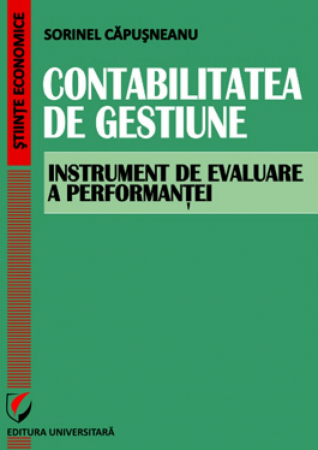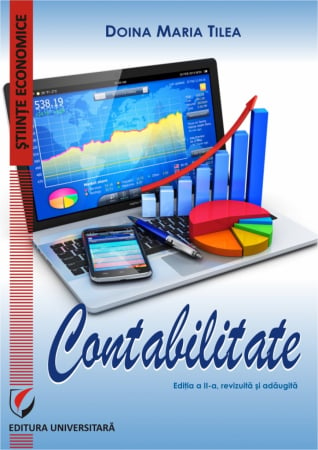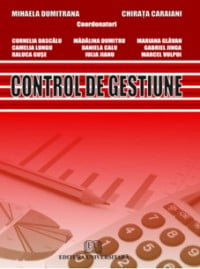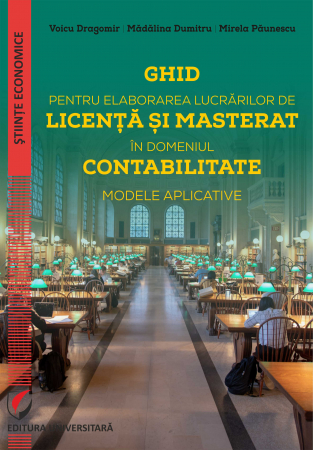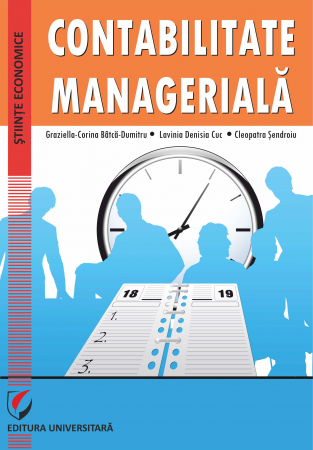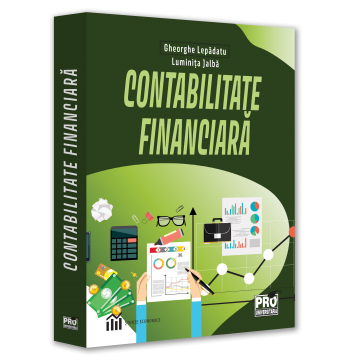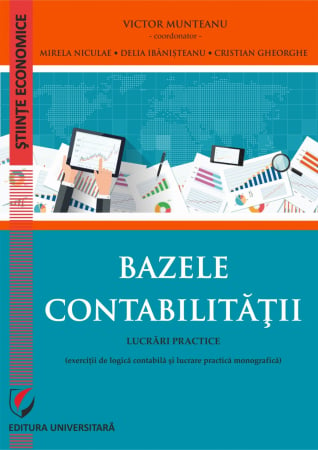Manuscript proposals: [email protected] / 0745 204 115 //// Tracking orders Individuals / Sales: 0745 200 357 / Orders Legal entities: 0721 722 783
Publisher: Editura Universitară
Author: Mihaela Leasa-Lixandru
Edition: I
Pages: 186
Publisher year: 2023
ISBN: 978-606-28-1621-6
DOI: https://doi.org/10.5682/9786062816216
Product Code:
9786062816216
Do you need help?
0745 200 357
- Description
- Download (1)
- Authors
- Content
- More details
- Reviews (0)
The accounting and calculation of environmental costs is intended to be a research that outlines the methods of improvement, through the organization and calculation of environmental costs, which can become a premise for the improvement of managerial accounting in a sector of activity, such as the oil industry, a sector that represents an important contributor to the Romanian budget, a major employer of a well-paid workforce, a first-rate investor in infrastructure and technology, as well as an importer of technical and managerial know-how.
The technological evolution of recent years has brought oil back to the forefront of the world energy industry. Hydrocarbons can today be extracted from geological formations that could not be counted as resources a decade ago. Natural gas, abundant on North American markets, offers the manufacturing industry a cheap and non-polluting form of energy, with much lower carbon emissions than coal. International trade in liquefied natural gas (LNG) has grown significantly, which contributes to the abolition of monopolies on regional markets and to obtaining better prices and contractual conditions for consumers. Oil offers consumers the cheapest and most accessible energy unit, which allows economic development and the construction of high-tech, reliable and non-polluting energy systems.
Also, Romania has an ancient and illustrious history of oil and gas extraction, although today it is no longer a world-class player, as it was in the interwar period. Although it has a relatively low dependence on gas imports (a significant fact on a monopolistic regional market and in an extremely tense geopolitical context), our country has declining hydrocarbon reserves and an industry that has adapted to market forces through reduction of industrial capacity.
Romania has the potential to benefit from technological progress and to sustainably develop new sources of hydrocarbons that will once again propel it to a leading position at the European level. The deep waters of the Black Sea attracted the interest of the world's largest private energy company, ExxonMobil, and the shale gas potential brought another top company, Chevron, to Romania. OMV Petrom, the regional leader of the oil and gas industry, invests constantly and significantly in the redevelopment of mature deposits, as does Romgaz, the largest domestic producer of natural gas. In addition, numerous other international oil companies, active in all segments of the industry (exploration and production, distribution, refining, retail, oil services and equipment production) have a contribution of investments, technology and managerial know-how.
On the horizon of 2020, with the prospect of new indigenous gas sources and new regional import sources, as well as increased interconnection with adjacent markets, Romania can become a regional hub. This would stimulate industrial competitiveness through optimal energy prices, would generate economic growth and new jobs. At the same time, it is necessary that the country's interest and sustainable development be promoted simultaneously with the creation of an attractive business environment in which the Government, regulatory agencies and legislators must be competent and steadfast partners of investors.
According to published data, the oil industry is among the top contributors to the general consolidated budget in 2018. The largest taxpayer, OMV Petrom (10.45 billion lei), paid from the date of privatization until 2018 about 27.8 billion euros. Generalizing, the context of the present scientific research is related to the attitude and behavior of the economic entities that are part of a world economic system, which have adapted to these developments, proceeding to the continuous modification of objectives and strategies. The new economic and technological conditions and opportunities existing worldwide have determined economic entities to be particularly concerned with satisfying customer requirements and preserving that part of the market held over time, while also seeking to minimize their costs. As I presented above, it turns out that the entities in the oil industry are going through a difficult period, strongly influenced by the crisis of renewable resources, the technological advance and the need to respect and protect the environment.
Among other things, it is necessary to improve access to foreign markets, monitor waste markets, balance energy prices, implement climate change policies, stimulate innovation, etc. It is necessary for the state institutions to look for methods and opportunities to reach the fulfillment of these wishes.
The present paper debates and amplifies a topical and interesting topic, linked precisely to the current socio-economic context of the field. The proposals advanced during the work, in order to find new viable solutions for the oil industry, are intended to be a catalyst for the improvement of managerial accounting at the level of economic entities in the Romanian oil industry. In essence, the problem addressed in the doctoral thesis aims to create a model for perfecting accounting by auditing and certifying environmental information in order to reflect the environmental impact in accounting and cost calculation, in the economic entities of the oil industry.
The technological evolution of recent years has brought oil back to the forefront of the world energy industry. Hydrocarbons can today be extracted from geological formations that could not be counted as resources a decade ago. Natural gas, abundant on North American markets, offers the manufacturing industry a cheap and non-polluting form of energy, with much lower carbon emissions than coal. International trade in liquefied natural gas (LNG) has grown significantly, which contributes to the abolition of monopolies on regional markets and to obtaining better prices and contractual conditions for consumers. Oil offers consumers the cheapest and most accessible energy unit, which allows economic development and the construction of high-tech, reliable and non-polluting energy systems.
Also, Romania has an ancient and illustrious history of oil and gas extraction, although today it is no longer a world-class player, as it was in the interwar period. Although it has a relatively low dependence on gas imports (a significant fact on a monopolistic regional market and in an extremely tense geopolitical context), our country has declining hydrocarbon reserves and an industry that has adapted to market forces through reduction of industrial capacity.
Romania has the potential to benefit from technological progress and to sustainably develop new sources of hydrocarbons that will once again propel it to a leading position at the European level. The deep waters of the Black Sea attracted the interest of the world's largest private energy company, ExxonMobil, and the shale gas potential brought another top company, Chevron, to Romania. OMV Petrom, the regional leader of the oil and gas industry, invests constantly and significantly in the redevelopment of mature deposits, as does Romgaz, the largest domestic producer of natural gas. In addition, numerous other international oil companies, active in all segments of the industry (exploration and production, distribution, refining, retail, oil services and equipment production) have a contribution of investments, technology and managerial know-how.
On the horizon of 2020, with the prospect of new indigenous gas sources and new regional import sources, as well as increased interconnection with adjacent markets, Romania can become a regional hub. This would stimulate industrial competitiveness through optimal energy prices, would generate economic growth and new jobs. At the same time, it is necessary that the country's interest and sustainable development be promoted simultaneously with the creation of an attractive business environment in which the Government, regulatory agencies and legislators must be competent and steadfast partners of investors.
According to published data, the oil industry is among the top contributors to the general consolidated budget in 2018. The largest taxpayer, OMV Petrom (10.45 billion lei), paid from the date of privatization until 2018 about 27.8 billion euros. Generalizing, the context of the present scientific research is related to the attitude and behavior of the economic entities that are part of a world economic system, which have adapted to these developments, proceeding to the continuous modification of objectives and strategies. The new economic and technological conditions and opportunities existing worldwide have determined economic entities to be particularly concerned with satisfying customer requirements and preserving that part of the market held over time, while also seeking to minimize their costs. As I presented above, it turns out that the entities in the oil industry are going through a difficult period, strongly influenced by the crisis of renewable resources, the technological advance and the need to respect and protect the environment.
Among other things, it is necessary to improve access to foreign markets, monitor waste markets, balance energy prices, implement climate change policies, stimulate innovation, etc. It is necessary for the state institutions to look for methods and opportunities to reach the fulfillment of these wishes.
The present paper debates and amplifies a topical and interesting topic, linked precisely to the current socio-economic context of the field. The proposals advanced during the work, in order to find new viable solutions for the oil industry, are intended to be a catalyst for the improvement of managerial accounting at the level of economic entities in the Romanian oil industry. In essence, the problem addressed in the doctoral thesis aims to create a model for perfecting accounting by auditing and certifying environmental information in order to reflect the environmental impact in accounting and cost calculation, in the economic entities of the oil industry.
-
Managerial accounting and the calculation of environmental costs
Download
MIHAELA LEASA-LIXANDRU
INTRODUCTION / 9
CHAPTER I: THE CURRENT SYSTEM OF KNOWLEDGE REGARDING MANAGERIAL ACCOUNTING IN ECONOMIC ENTITIES FROM THE PETROLEUM INDUSTRY / 13
1.1. The organization and operation of the accounting information system in the oil industry / 13
1.1.1. The use of the accounting information system in economic entities from the oil industry / 20
1.1.2. The role of the information provided by the accounting information system in assisting the decision / 24
1.1.3. The connection between financial and managerial accounting within the accounting information system / 25
1.2. Managerial accounting, the structural component of the accounting information system / 27
1.2.1. The legislative and conceptual framework for the organization of managerial accounting / 28
1.2.2. Past, present and development perspectives of managerial accounting / 30
1.2.3. Cost fundamental element of managerial accounting / 33
1.3. Advanced methods used by managerial accounting, the structural component of the accounting information system. / 34
CHAPTER II: THE EVOLUTION OF ENVIRONMENTAL MANAGERIAL ACCOUNTING AND ITS INTEGRATION IN THE ACCOUNTING INFORMATION SYSTEM / 42
2.1. The emergence and development of environmental managerial accounting / 42
2.1.1. Benefits of implementing environmental management accounting in economic entities / 44
2.1.2. The connections between environmental managerial accounting and financial, statistical, environmental and sustainability reporting requirements / 47
2.1.3. Communication between accounting structures and production structures / 49
2.2. Criteria for identification and classification of environmental managerial accounting / 52
2.2.1. The relationship of the economic entity with nature based on the use of natural capital: the eco-balance sheet / 54
2.2.2. The relationship between the economic entity and human capital: the eco-social balance sheet / 55
2.3. The reporting framework at the European level, the foundation of the development of environmental management accounting / 56
2.3.1. The reporting framework of environmental managerial accounting in Romania / 57
2.3.2. Integrated accounting of the economic environment according to the United Nations Organization (SEEA) and classification of environmental protection expenses (CEPA) / 60
2.3.3. Theories of ecological sustainability applied in managerial environmental accounting - the impasse of internalization of externalities / 67
2.3.4. Circular production in the context of reporting at the European level / 70
2.4. Typology of environmental costs / 71
2.5. Performance measurement - an essential condition for improving managerial accounting of economic entities in the oil industry / 77
2.5.1. Financial and non-financial performance indicators / 78
2.5.2. Non-financial performance indicators / 81
2.6. The need to use accounting and the calculation of environmental costs, the premise of managerial improvement of economic entities in the oil industry / 87
CHAPTER III: AUDITING AND CERTIFICATION OF ENVIRONMENTAL INFORMATION IN VIEW OF THE REFLECTION OF ENVIRONMENTAL IMPACT IN MANAGERIAL ACCOUNTING / 91
3.1. General aspects regarding the environmental audit / 91
3.2. The principles and objectives of the environmental audit / 92
3.2.1. Principles of environmental audit / 93
3.2.2. The objectives of the environmental audit / 94
3.3. Environmental aspects, the foundation of the audit process / 95
3.4. Organization of the environmental audit mission / 98
3.4.1. Environmental audit - the specific methodology for carrying out the mission / 100
3.4.2. Environmental risk management / 108
3.4.2.1. The meaning of the notion of environmental risk / 111
3.4.2.2. The implementation of environmental risk management, its advantages and particularities / 113
3.5. Environmental management systems / 114
3.5.1. Community environmental management and audit system (EMAS) / 116
3.5.2. Certification of environmental management systems / 123
CHAPTER IV: MODELING THE CALCULATION OF ENVIRONMENTAL COSTS IN VIEW OF THE IMPROVEMENT OF MANAGERIAL ACCOUNTING / 128
4.1. Waste management / 129
4.2. Management of environmental indicators / 132
4.3. The management of the activity of waste recovery and environmental protection as a national economic policy / 139
4.4. Economic-financial performance of the economic entity / 141
4.5. Social performance in health and safety / 145
4.6. Modeling the calculation of environmental costs using the ABC method / 148
4.6.1. Theoretical-comparative analysis of the calculation of environmental costs by the traditional method and the ABC method / 150
4.6.2. Modeling the calculation of environmental costs related to the oil industry based on the ABC algorithm / 153
4.6.3. The matrix for the calculation of environmental costs based on the ABC algorithm, a tool for improving managerial accounting / 157
4.6.4. Valences and limits of modeling the calculation of environmental costs using the ABC algorithm / 164
LIST OF FIGURES / 167
LIST OF TABLES / 169
LIST OF ABBREVIATIONS / 170
BIBLIOGRAPHICAL REFERENCES / 171
CHAPTER I: THE CURRENT SYSTEM OF KNOWLEDGE REGARDING MANAGERIAL ACCOUNTING IN ECONOMIC ENTITIES FROM THE PETROLEUM INDUSTRY / 13
1.1. The organization and operation of the accounting information system in the oil industry / 13
1.1.1. The use of the accounting information system in economic entities from the oil industry / 20
1.1.2. The role of the information provided by the accounting information system in assisting the decision / 24
1.1.3. The connection between financial and managerial accounting within the accounting information system / 25
1.2. Managerial accounting, the structural component of the accounting information system / 27
1.2.1. The legislative and conceptual framework for the organization of managerial accounting / 28
1.2.2. Past, present and development perspectives of managerial accounting / 30
1.2.3. Cost fundamental element of managerial accounting / 33
1.3. Advanced methods used by managerial accounting, the structural component of the accounting information system. / 34
CHAPTER II: THE EVOLUTION OF ENVIRONMENTAL MANAGERIAL ACCOUNTING AND ITS INTEGRATION IN THE ACCOUNTING INFORMATION SYSTEM / 42
2.1. The emergence and development of environmental managerial accounting / 42
2.1.1. Benefits of implementing environmental management accounting in economic entities / 44
2.1.2. The connections between environmental managerial accounting and financial, statistical, environmental and sustainability reporting requirements / 47
2.1.3. Communication between accounting structures and production structures / 49
2.2. Criteria for identification and classification of environmental managerial accounting / 52
2.2.1. The relationship of the economic entity with nature based on the use of natural capital: the eco-balance sheet / 54
2.2.2. The relationship between the economic entity and human capital: the eco-social balance sheet / 55
2.3. The reporting framework at the European level, the foundation of the development of environmental management accounting / 56
2.3.1. The reporting framework of environmental managerial accounting in Romania / 57
2.3.2. Integrated accounting of the economic environment according to the United Nations Organization (SEEA) and classification of environmental protection expenses (CEPA) / 60
2.3.3. Theories of ecological sustainability applied in managerial environmental accounting - the impasse of internalization of externalities / 67
2.3.4. Circular production in the context of reporting at the European level / 70
2.4. Typology of environmental costs / 71
2.5. Performance measurement - an essential condition for improving managerial accounting of economic entities in the oil industry / 77
2.5.1. Financial and non-financial performance indicators / 78
2.5.2. Non-financial performance indicators / 81
2.6. The need to use accounting and the calculation of environmental costs, the premise of managerial improvement of economic entities in the oil industry / 87
CHAPTER III: AUDITING AND CERTIFICATION OF ENVIRONMENTAL INFORMATION IN VIEW OF THE REFLECTION OF ENVIRONMENTAL IMPACT IN MANAGERIAL ACCOUNTING / 91
3.1. General aspects regarding the environmental audit / 91
3.2. The principles and objectives of the environmental audit / 92
3.2.1. Principles of environmental audit / 93
3.2.2. The objectives of the environmental audit / 94
3.3. Environmental aspects, the foundation of the audit process / 95
3.4. Organization of the environmental audit mission / 98
3.4.1. Environmental audit - the specific methodology for carrying out the mission / 100
3.4.2. Environmental risk management / 108
3.4.2.1. The meaning of the notion of environmental risk / 111
3.4.2.2. The implementation of environmental risk management, its advantages and particularities / 113
3.5. Environmental management systems / 114
3.5.1. Community environmental management and audit system (EMAS) / 116
3.5.2. Certification of environmental management systems / 123
CHAPTER IV: MODELING THE CALCULATION OF ENVIRONMENTAL COSTS IN VIEW OF THE IMPROVEMENT OF MANAGERIAL ACCOUNTING / 128
4.1. Waste management / 129
4.2. Management of environmental indicators / 132
4.3. The management of the activity of waste recovery and environmental protection as a national economic policy / 139
4.4. Economic-financial performance of the economic entity / 141
4.5. Social performance in health and safety / 145
4.6. Modeling the calculation of environmental costs using the ABC method / 148
4.6.1. Theoretical-comparative analysis of the calculation of environmental costs by the traditional method and the ABC method / 150
4.6.2. Modeling the calculation of environmental costs related to the oil industry based on the ABC algorithm / 153
4.6.3. The matrix for the calculation of environmental costs based on the ABC algorithm, a tool for improving managerial accounting / 157
4.6.4. Valences and limits of modeling the calculation of environmental costs using the ABC algorithm / 164
LIST OF FIGURES / 167
LIST OF TABLES / 169
LIST OF ABBREVIATIONS / 170
BIBLIOGRAPHICAL REFERENCES / 171
The accounting and calculation of environmental costs is intended to be a research that outlines the methods of improvement, through the organization and calculation of environmental costs, which can become a premise for the improvement of managerial accounting in a sector of activity, such as the oil industry, a sector that represents an important contributor to the Romanian budget, a major employer of a well-paid workforce, a first-rate investor in infrastructure and technology, as well as an importer of technical and managerial know-how.
The technological evolution of recent years has brought oil back to the forefront of the world energy industry. Hydrocarbons can today be extracted from geological formations that could not be counted as resources a decade ago. Natural gas, abundant on North American markets, offers the manufacturing industry a cheap and non-polluting form of energy, with much lower carbon emissions than coal. International trade in liquefied natural gas (LNG) has grown significantly, which contributes to the abolition of monopolies on regional markets and to obtaining better prices and contractual conditions for consumers. Oil offers consumers the cheapest and most accessible energy unit, which allows economic development and the construction of high-tech, reliable and non-polluting energy systems.
Also, Romania has an ancient and illustrious history of oil and gas extraction, although today it is no longer a world-class player, as it was in the interwar period. Although it has a relatively low dependence on gas imports (a significant fact on a monopolistic regional market and in an extremely tense geopolitical context), our country has declining hydrocarbon reserves and an industry that has adapted to market forces through reduction of industrial capacity.
Romania has the potential to benefit from technological progress and to sustainably develop new sources of hydrocarbons that will once again propel it to a leading position at the European level. The deep waters of the Black Sea attracted the interest of the world's largest private energy company, ExxonMobil, and the shale gas potential brought another top company, Chevron, to Romania. OMV Petrom, the regional leader of the oil and gas industry, invests constantly and significantly in the redevelopment of mature deposits, as does Romgaz, the largest domestic producer of natural gas. In addition, numerous other international oil companies, active in all segments of the industry (exploration and production, distribution, refining, retail, oil services and equipment production) have a contribution of investments, technology and managerial know-how.
On the horizon of 2020, with the prospect of new indigenous gas sources and new regional import sources, as well as increased interconnection with adjacent markets, Romania can become a regional hub. This would stimulate industrial competitiveness through optimal energy prices, would generate economic growth and new jobs. At the same time, it is necessary that the country's interest and sustainable development be promoted simultaneously with the creation of an attractive business environment in which the Government, regulatory agencies and legislators must be competent and steadfast partners of investors.
According to published data, the oil industry is among the top contributors to the general consolidated budget in 2018. The largest taxpayer, OMV Petrom (10.45 billion lei), paid from the date of privatization until 2018 about 27.8 billion euros. Generalizing, the context of the present scientific research is related to the attitude and behavior of the economic entities that are part of a world economic system, which have adapted to these developments, proceeding to the continuous modification of objectives and strategies. The new economic and technological conditions and opportunities existing worldwide have determined economic entities to be particularly concerned with satisfying customer requirements and preserving that part of the market held over time, while also seeking to minimize their costs. As I presented above, it turns out that the entities in the oil industry are going through a difficult period, strongly influenced by the crisis of renewable resources, the technological advance and the need to respect and protect the environment.
Among other things, it is necessary to improve access to foreign markets, monitor waste markets, balance energy prices, implement climate change policies, stimulate innovation, etc. It is necessary for the state institutions to look for methods and opportunities to reach the fulfillment of these wishes.
The present paper debates and amplifies a topical and interesting topic, linked precisely to the current socio-economic context of the field. The proposals advanced during the work, in order to find new viable solutions for the oil industry, are intended to be a catalyst for the improvement of managerial accounting at the level of economic entities in the Romanian oil industry. In essence, the problem addressed in the doctoral thesis aims to create a model for perfecting accounting by auditing and certifying environmental information in order to reflect the environmental impact in accounting and cost calculation, in the economic entities of the oil industry.
The technological evolution of recent years has brought oil back to the forefront of the world energy industry. Hydrocarbons can today be extracted from geological formations that could not be counted as resources a decade ago. Natural gas, abundant on North American markets, offers the manufacturing industry a cheap and non-polluting form of energy, with much lower carbon emissions than coal. International trade in liquefied natural gas (LNG) has grown significantly, which contributes to the abolition of monopolies on regional markets and to obtaining better prices and contractual conditions for consumers. Oil offers consumers the cheapest and most accessible energy unit, which allows economic development and the construction of high-tech, reliable and non-polluting energy systems.
Also, Romania has an ancient and illustrious history of oil and gas extraction, although today it is no longer a world-class player, as it was in the interwar period. Although it has a relatively low dependence on gas imports (a significant fact on a monopolistic regional market and in an extremely tense geopolitical context), our country has declining hydrocarbon reserves and an industry that has adapted to market forces through reduction of industrial capacity.
Romania has the potential to benefit from technological progress and to sustainably develop new sources of hydrocarbons that will once again propel it to a leading position at the European level. The deep waters of the Black Sea attracted the interest of the world's largest private energy company, ExxonMobil, and the shale gas potential brought another top company, Chevron, to Romania. OMV Petrom, the regional leader of the oil and gas industry, invests constantly and significantly in the redevelopment of mature deposits, as does Romgaz, the largest domestic producer of natural gas. In addition, numerous other international oil companies, active in all segments of the industry (exploration and production, distribution, refining, retail, oil services and equipment production) have a contribution of investments, technology and managerial know-how.
On the horizon of 2020, with the prospect of new indigenous gas sources and new regional import sources, as well as increased interconnection with adjacent markets, Romania can become a regional hub. This would stimulate industrial competitiveness through optimal energy prices, would generate economic growth and new jobs. At the same time, it is necessary that the country's interest and sustainable development be promoted simultaneously with the creation of an attractive business environment in which the Government, regulatory agencies and legislators must be competent and steadfast partners of investors.
According to published data, the oil industry is among the top contributors to the general consolidated budget in 2018. The largest taxpayer, OMV Petrom (10.45 billion lei), paid from the date of privatization until 2018 about 27.8 billion euros. Generalizing, the context of the present scientific research is related to the attitude and behavior of the economic entities that are part of a world economic system, which have adapted to these developments, proceeding to the continuous modification of objectives and strategies. The new economic and technological conditions and opportunities existing worldwide have determined economic entities to be particularly concerned with satisfying customer requirements and preserving that part of the market held over time, while also seeking to minimize their costs. As I presented above, it turns out that the entities in the oil industry are going through a difficult period, strongly influenced by the crisis of renewable resources, the technological advance and the need to respect and protect the environment.
Among other things, it is necessary to improve access to foreign markets, monitor waste markets, balance energy prices, implement climate change policies, stimulate innovation, etc. It is necessary for the state institutions to look for methods and opportunities to reach the fulfillment of these wishes.
The present paper debates and amplifies a topical and interesting topic, linked precisely to the current socio-economic context of the field. The proposals advanced during the work, in order to find new viable solutions for the oil industry, are intended to be a catalyst for the improvement of managerial accounting at the level of economic entities in the Romanian oil industry. In essence, the problem addressed in the doctoral thesis aims to create a model for perfecting accounting by auditing and certifying environmental information in order to reflect the environmental impact in accounting and cost calculation, in the economic entities of the oil industry.
If you want to express your opinion about this product you can add a review.
write a review

6359.png)
![Managerial accounting and the calculation of environmental costs - Mihaela Leasa-Lixandru [1] Managerial accounting and the calculation of environmental costs - Mihaela Leasa-Lixandru [1]](https://gomagcdn.ro/domains/editurauniversitara.ro/files/product/large/contabilitatea-manageriala-si-calculatia-costurilor-de-mediu-698871.jpg)
